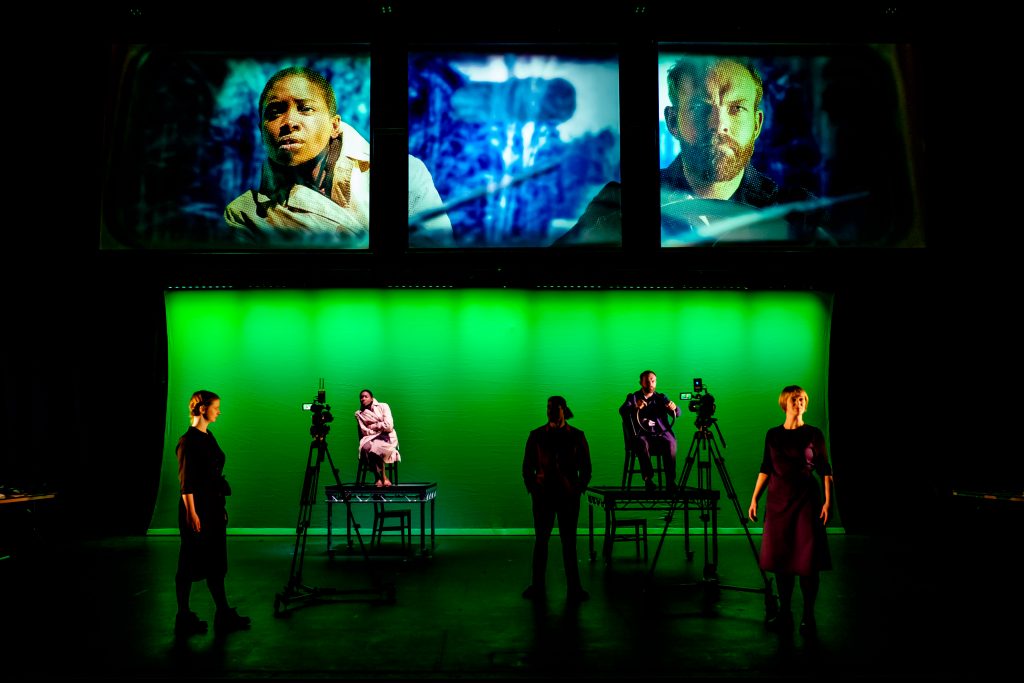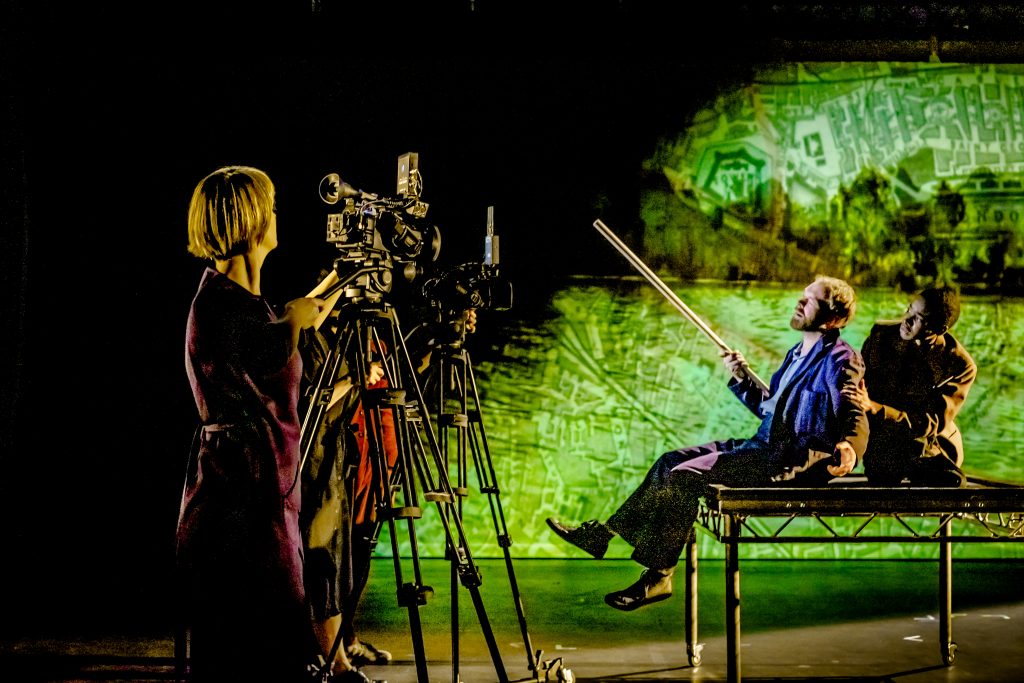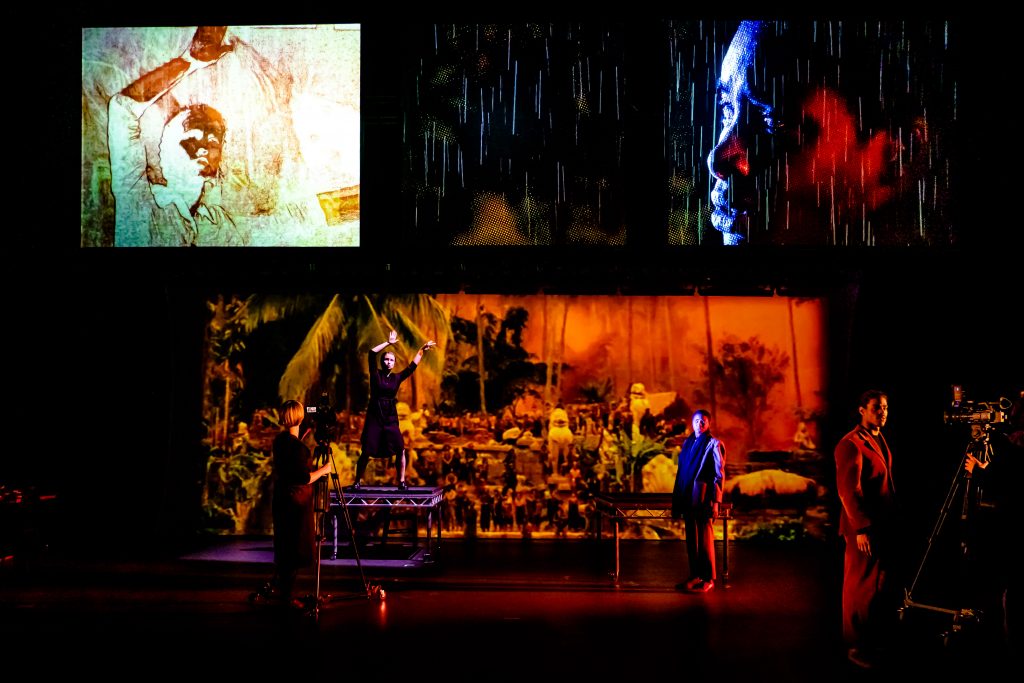Re-thinking Heart of Darkness: An Interview with Keicha Greenidge & Morgan Bailey
Heart of Darkness, co-stars Keicha Greenidge and Morgan Bailey, are in a playful disposition. They’ve reached the end of a nationwide UK tour of Imitating the Dog’s new theatrical interpretation of Joseph Conrad’s novel about the Belgian empire’s horrific exploits in the Congo. Without foreknowledge of the text, you could be forgiven for thinking the discussion centred on a lighter topic. A romantic comedy, perhaps. The two certainly look the part. Beautiful would-be heroine Greenidge rests her head affectionately on handsome Bailey’s shoulder. He teases her about her age. Yet their light-hearted rapport doesn’t mitigate the gravity of the themes, nor their passion for the project.

The contentious Heart of Darkness has been dividing opinion for decades. Why this story now?
‘I believe this novel has made a huge impact on the creators [Andrew Quick and Peter Brooks]. It’s followed them since their adolescence’ Keicha proffers, tentative about answering on their behalf. ‘A lot of the issues raised in the novel-for example race, gender, imperialism and capitalism -are unfortunately still relevant today. The overall intention is to start a conversation about how we live’.
Quick and Brooks are also heavily influenced by Francis Ford Coppola’s Apocalypse Now; said to have been a re-contextualisation of Conrad’s oeuvre. Excerpts of the Vietnam war drama feature in this stage adaptation.
The creators subvert the novel’s tropes from the outset. In this mis-en-abîme re-imagining, the chief protagonist is not a Caucasian male but an African woman. Greenidge plays Congolese-American detective Charlie Marlow, sent to a war-ravaged Europe to retrieve rogue station captain Kurtz; dead or alive. Whereas it is Kurtz who unravels in the novel, here it’s Marlow who starts to go to pieces.
‘The story exposes what we will do for financial gain against our better judgement. There is a little seed of darkness in us all’, Keicha considers.
Beyond reading the text itself, in preparation for the project Greenidge began researching revolutionary socialist Congolese statesman Patrice Lumumba; infamously gunned down in his prime by one of his own men with the support of the CIA.
‘The fact that he was assassinated for his efforts to lead his country to independence and he is not widely celebrated…I was ashamed to say I had never heard of him’ Keicha admits. Studying Lumumba’s life led her to Adam Hochschild’s King Leopold’s Ghost; which she describes as ‘one of the most disturbing things I’ve ever read’, visibly shuddering at the thought.
Morgan, in his own words, plays an ‘ensemble of characters’. His favourite is an anonymous narrator whose monologues bookend the play. For Bailey, this particular character exemplifies humanity’s redemptive qualities as well as the capacity towards, well, darkness.
Quick and Brooks don’t shy away from making the connection between Capitalism and our own propensity for avarice. At a showing in Liverpool, one audience member challenged this viewpoint; listing the atrocities done in the name of Communism. For Bailey, this only underlines the importance of the anonymous commentator. ‘It doesn’t matter what the system of organisation is. Black or White. We are capable of harm if we let the worst aspects of our nature, such as greed, take over’.
Behind the scenes, there has been much collaboration between the cast and creators.
‘It was a safe place to talk about our individual experiences’ Keicha recalls ‘We all had a voice in the room. It felt more collaborative than anything I had ever worked on’
Where they could, the actors tried to give some cultural input that might not have been obvious to ethnically-English Quick and Brooks. Keicha cites an example of Marlow’s encounter with a character (also played by Bailey) from a neighbouring region in Central Africa.
‘We’re dancing to a song but it’s the waltz. And this in a [re-imagined] context where Africa was never colonised? It makes no sense’.

The actors argued for traditional indigenous moves to be included instead. Their efforts were unsuccessful, thus to compensate, they added a little funk to the stiff German steps.
Having primarily worked on screen, this was the first theatre outing for both Bailey and Greenidge. The young actors go way back. Born and raised in Manchester, North-West England to African-Caribbean parents, the two first met through their talent agency. It was Keicha who recommended Morgan for the role when another cast member dropped out. Bailey hit the ground running, joining the team whilst they rehearsed in Ancona, Italy. Previously unfamiliar with Heart of Darkness, Greenidge came to the text free of preconceptions and apprehension; aided by a supportive team. However, some trepidation kicked in regards to ‘…the layers of production as a whole. I was walking into a well established theatre company, that had a great deal of first hand experience and references that were continually at play. For the first few days of rehearsals my head was positively spinning. But then you just have to level up!’
Celebrated Nigerian author, Chinua Achebe’s name inevitably comes up several times. His scathing remarks about the novel’s racist and dehumanising stereotypes are well-documented. Excerpts of Achebe’s essays are quoted throughout Quick and Brooks’ adaptation. Can Heart of Darkness be defended (as some have tried) for being ‘of its time’? Morgan doesn’t let Conrad off the hook. ‘It’s always a lot easier to follow the social norms rather than challenge them’.
‘I can’t cosign either’ adds Keicha. ‘Reading this novel with a smidgen of knowledge of our history, how can you still see past the dehumanisation? Making even the smallest excuses and space for these ideologies is what led to the atrocities in the first place. I can only see it through the lens of a black woman who often feels silenced. How can the novel not infuriate me?’
At one point Marlow decries this very silencing of African voices, whilst a ‘white saviour’ is left to speak truth to power. Is this mindset still prevalent in 2019?
There’s no hesitation on Greenidge’s part. ‘Definitely. Africa does not need this kind of narrative; especially if you are not going to talk about its beauty, resilience and how it was divided up in the first place’.
The recent furore over David Lammy’s comments about Comic Relief are salient at this juncture. For Bailey, the vehement reactions to the Labour MP’s observations are telling. Neither does he think the play goes far enough; particularly in regards to Britain’s imperialist culpability.
Could it be that the public discourse is currently too fraught for something more polemic, as depressingly topical as the piece is? To some extent, Greenidge agrees; bringing the discussion full circle. ‘The creators wanted to start a conversation’. Perhaps this version of Heart of Darkness is a nudge in the right direction, rather than a slap.
This interview also features on I Was Just Thinking…




Its very interesting while reading it,thank you for posting such a good article.
your website is very nice, the article is very enlightening, I wish you continued success.